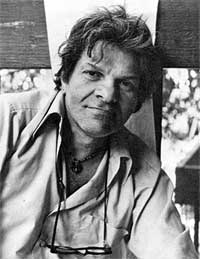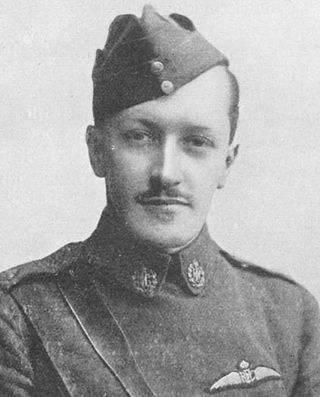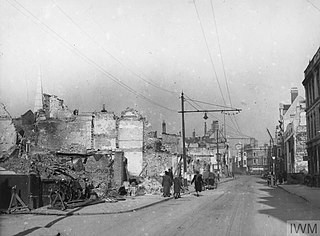Related Research Articles

The Boeing B-17 Flying Fortress is an American four-engined heavy bomber developed in the 1930s for the United States Army Air Corps (USAAC). A fast and high-flying bomber of its era, the B-17 was used primarily in the European Theater of Operations and dropped more bombs than any other aircraft during World War II. It is the third-most produced bomber of all time, behind the American four-engined Consolidated B-24 Liberator and the German multirole, twin-engined Junkers Ju 88. It was also employed as a transport, antisubmarine aircraft, drone controller, and search-and-rescue aircraft.

Mervyn Laurence Peake was an English writer, artist, poet, and illustrator. He is best known for what are usually referred to as the Gormenghast books. The four works were part of what Peake conceived as a lengthy cycle, the completion of which was prevented by his death. They are sometimes compared to the work of his older contemporary J. R. R. Tolkien, but Peake's surreal fiction was influenced by his early love for Charles Dickens and Robert Louis Stevenson rather than Tolkien's studies of mythology and philology.
Gormenghast is a fantasy series by British author Mervyn Peake, about the inhabitants of Castle Gormenghast, a sprawling, decaying, Gothic structure. Originally conceived as a single on-going novel, the series was ended by Peake's death and comprises three novels: Titus Groan (1946), Gormenghast (1950) and Titus Alone (1959); and a novella, Boy in Darkness (1956), whose canonical status is debated. Peake was writing a fourth novel, Titus Awakes, at the time of his death in 1968. The book was completed by Peake's widow Maeve Gilmore in the 1970s, but was not published until 2011 after it was discovered by their family.

Michael Derek Elworthy Jarman was an English artist, film maker, costume designer, stage designer, writer, gardener, and gay rights activist.

Ryan Anthony Peake is a Canadian musician, singer and songwriter who is best known as the rhythm guitarist, keyboardist, and backing vocalist of the Canadian rock band Nickelback. He has been with the band since their inception and is best known for his prominent vocals on the Nickelback songs "Savin' Me", "Hollywood", and "Gotta Be Somebody". He has performed lead vocals on a range of different cover songs at live Nickelback concerts such as "Saturday Night's Alright for Fighting", "Use Somebody", "I Ran", "Everlong" and "Super Bon Bon". When Nickelback performs Chad Kroeger's solo hit "Hero" live, Ryan sings the vocal parts originally performed by Josey Scott. Peake has writing credits for several Nickelback songs such as "Someday", "Savin' Me", "Miss You", and "Edge of a Revolution". Peake's instruments have included Gibson Flying Vs, Gibson Explorers, and Gibson Les Pauls. When Nickelback performs their song "Photograph", he uses an acoustic guitar once owned by his father.

Gregory Nunzio Corso was an American poet and a key member of the Beat movement. He was one of the youngest of the inner circle of Beat Generation writers.
Terence Rogers Tiller was an English poet and radio producer.

The Angelus is a Catholic devotion commemorating the Incarnation of Christ. As with many Catholic prayers, the name Angelus is derived from its incipit—the first few words of the text: Angelus Domini nuntiavit Mariæ. The devotion is practised by reciting as versicle and response three Biblical verses narrating the mystery, alternating with the prayer "Hail Mary". The Angelus exemplifies a species of prayers called the "prayer of the devotee".

William Barnard Rhodes-Moorhouse VC was an English recipient of the Victoria Cross, the highest and most prestigious award for gallantry in the face of the enemy that can be awarded to British and Commonwealth forces. Rhodes-Moorhouse was the first airman to be awarded the VC.

Kelly Ingram Park, formerly West Park, is a 4 acres (1.6 ha) park located in Birmingham, Alabama. It is bounded by 16th and 17th Streets and 5th and 6th Avenues North in the Birmingham Civil Rights District. The park, just outside the doors of the 16th Street Baptist Church, served as a central staging ground for large-scale demonstrations during the American Civil Rights Movement of the 1960s.

Maxine Peake is an English actress and narrator. She is known for her roles as Twinkle in dinnerladies, a sitcom on BBC One (1998–2000), as Veronica Ball in Shameless, the comedy drama from Channel 4 (2004–2007), Martha Costello in the BBC One legal drama Silk (2011–2014), and Grace Middleton in the BBC One drama series The Village (2013–2014). In 2017, she starred in the Black Mirror episode "Metalhead". She has also played the title role in Hamlet, as well as the notorious serial killer Myra Hindley in See No Evil: The Moors Murders, the critically acclaimed 2006 dramatisation by ITV of the Moors murders.
Marjorie Westbury was an English radio actress and singer. Her career lasted for more than fifty years.
Emile Victor Rieu CBE was a British classicist, publisher, poet and translator. He initiated the Penguin Classics series of books in 1946 and edited it for twenty years.

The Southampton Blitz was the heavy bombing of Southampton by the Nazi German Luftwaffe during World War II. Southampton was a strategic bombing target for the Luftwaffe as it contained both busy docks with associated business premises and factories and the Supermarine factory building Spitfires in Woolston. Being a large port city on the south coast it was within easy reach of German airfields in France.

Air Commandant Dame Felicity Hyde, Lady Peake was the founding director of the Women's Royal Air Force (WRAF) She started flying when her first husband took up the hobby in 1935, but in 1946 became the first director of the WRAF. She was Honorary Aide-de-camp to King George VI from 1949 to 1950.

New Worlds for Old is an anthology of fantasy short stories, edited by American writer Lin Carter. It was first published in paperback by Ballantine Books in September 1971 as the thirty-fifth volume of its Ballantine Adult Fantasy series. It was the fourth such anthology assembled by Carter for the series.
"Ballad of Birmingham" is a poem by Dudley Randall, that he published as a broadside in 1965. It was written in response to the 1963 bombing at the 16th Street Baptist Church in Birmingham, Alabama. The poem was set to music by folk singer Jerry Moore in 1967 after he read it in a newspaper, and features on his album Life is a Constant Journey Home.

Major Timothy "Tim" Nigel Peake is a British author, Army Air Corps officer and European Space Agency astronaut.

The Secret Diaries of Miss Anne Lister is a 2010 British biographical historical drama film about 19th-century Yorkshire landowner Anne Lister. Made for television, the film was directed by James Kent and starred Maxine Peake as Lister. The script by Jane English drew from Lister's diaries, written in code, and decoded many years after her death. The story follows Lister's lesbian relationships and her independent lifestyle as an industrialist. The Secret Diaries of Miss Anne Lister held its world premiere screening at the London Lesbian and Gay Film Festival in March 2010 and was broadcast in the United Kingdom by the BBC in May 2010.

"A Little Boy Lost" is a poem of the Songs of Experience series created in 1794 after the Songs of Innocence (1789) by the poet William Blake. The poem centers on the theme of religious persecution and the corrupted dictates of dogmatic Church teachings. As part of Songs of Experience the poem is set in the wider context of exploring the suffering of innocent and oppressed individuals—in this case a young boy, and his parents—within a flawed society that is oppressed and disillusioned with life's experience.
References
- ↑ AbeBooks listing of first-edition print date
- ↑ Peake, Robert. "Discovering an Artistic Ancestor". www.robertpeake.com. Retrieved 24 July 2011.
Plot summary
- ↑ Diversity Website archive of radio broadcast information]